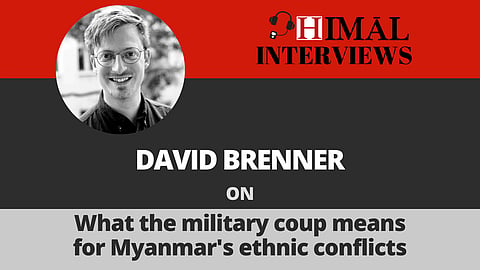Interview
What the military coup means for Myanmar’s ethnic conflicts
And why there’s a need to support a diverse, multi-ethnic coalition of opposition groups in Myanmar.
In this episode of Himal interviews, we speak to David Brenner, a Himal contributor, the author of Rebel Politics: A Political Sociology of Armed Struggle in Myanmar's Borderlands, and a lecturer at the School of Global Studies, University of Sussex. Brenner talks to us about how the military coup will impact the country's unresolved ethnic conflicts, how international aid has sometimes empowered the military establishment, and why there's a need to support a diverse, multi-ethnic coalition of opposition groups in Myanmar.

